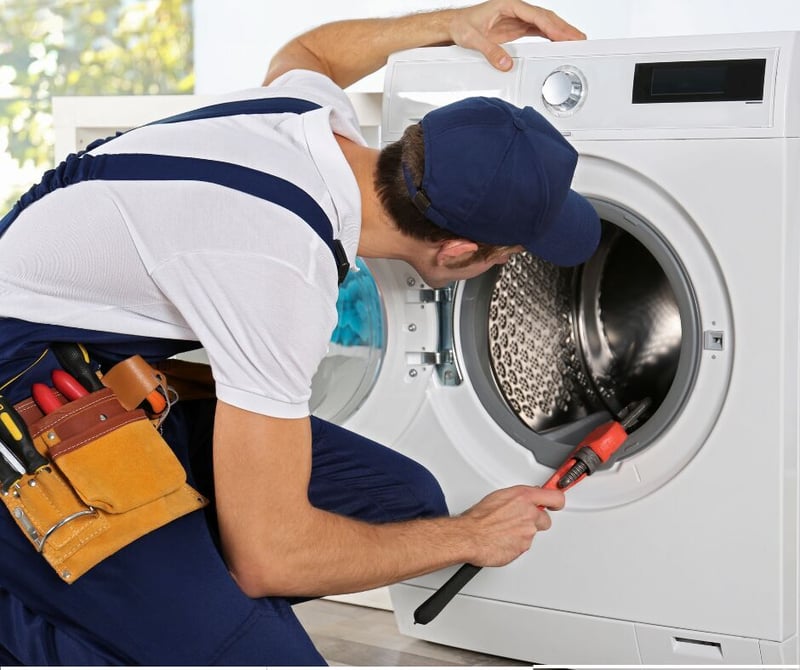Appliance Repairs Centre Offers Expert Advice on Preventing Washing Machine Leaks
Written by: Nellah Save to Instapaper
Pretoria, Centurion, and Midrand – Homeowners experiencing washing machine leaks can benefit from expert advice provided by Appliance Repairs Centre, a leading appliance repair company with over 38 years of experience in the industry. The company highlights the most common causes of washing machine leaks and provides practical tips on how to prevent them.
Common Causes of Washing Machine Leaks
1. Damaged or Worn-Out HosesOne of the most frequent reasons for washing machine leaks is damaged or worn-out hoses. Over time, hoses can become brittle, crack, or develop small holes, leading to water leakage. Regular inspection and timely replacement of hoses can prevent such leaks.
2. Faulty Door SealThe door seal, or gasket, ensures that water stays inside the washing machine during a wash cycle. A damaged, loose, or dirty seal can cause water to leak from the bottom of the machine. Regular cleaning and inspection of the seal are crucial for maintaining its effectiveness.
3. Clogged or Faulty Drain PumpThe drain pump expels water from the washing machine at the end of a wash cycle. A clogged or faulty pump can cause water to leak. Cleaning the pump filter and ensuring it is free of obstructions can resolve this issue.
4. Overloading the Washing MachineOverloading puts excessive pressure on various components, leading to leaks. Following the manufacturer’s guidelines regarding load capacity and balancing the load evenly can help prevent overloading and maintain the machine's proper functioning.
5. Internal Leaks from ComponentsInternal components such as the water inlet valve, tub, or drum may develop leaks. These issues often require professional assistance to diagnose and repair. Regular maintenance can help detect problems early.
Signs That Your Washing Machine Needs Immediate Attention
- Puddles of Water Around the Machine: Water pooling around the washing machine indicates a leak. Ignoring this can lead to more severe problems and damage to flooring and surrounding areas.
- Unusual Noises During Operation: Grinding, knocking, or buzzing sounds during a wash cycle can signal internal issues that may eventually lead to leaks. Addressing these noises promptly can prevent further damage.
- Inefficient Washing Cycles: If the washing machine is not completing its cycles properly or clothes are not coming out clean, it could be due to an underlying problem causing a leak.
- Visible Damage to Hoses or Seals: Regularly inspecting hoses and seals for visible damage can help identify potential leak sources. Replacing damaged parts immediately can prevent leaks.
How to Prevent Washing Machine Leaks
- Regular Maintenance: Performing regular maintenance checks can help identify and address potential issues before they escalate. This includes cleaning filters, inspecting hoses and seals, and ensuring the machine is level.
- Using the Right Detergent: Using the appropriate type and amount of detergent can prevent excessive suds, which can contribute to leaks. High-efficiency (HE) detergents are recommended for modern washing machines.
- Proper Installation: Ensuring proper installation of the washing machine can prevent leaks. This includes making sure the machine is level, hoses are securely connected, and there are no kinks in the hoses.
- Avoiding Overloading: Following the manufacturer’s guidelines for load capacity and avoiding overloading the machine can reduce the risk of leaks.
- Timely Repairs: Addressing signs of wear and tear or minor leaks immediately can prevent more significant issues. Appliance Repairs Centre’s certified technicians are available 24/7 to provide timely repairs and keep washing machines in top condition.
For more information or to schedule a service, contact Appliance Repairs Centre at:
Appliance Repairs Centre609 Van Zyl Ave, Eloffsdal, Pretoria, 0084Phone: 012 335 8610
By following these guidelines, homeowners can extend the life of their washing machines and ensure efficient, leak-free operation.
Get new press articles by email
Many business owners struggle to consistently get new clients. At Click Results, we have a 5 step process that turns their website into a marketing machine that attracts new clients so that their businesses will grow again.
Latest from
- Transform Your Garden with Culterra Acid Compost - A Solution for Acid-Loving Plants
- Premium Commercial Property Opportunities with Atterbury
- Why Every Couple Should Consider an Ante-Nuptial Contract in Pretoria
- Beskerm Jou Geliefdes met ’n Testamentêre Trust
- Dispo Drops – Blue Razz Salts E-Liquid 30ml - The Ultimate Vaping Experience
- Transform Your Windows with Contra-Vision from Window Art
- Costs of Fitting the Wrong Tyres - Why Choosing the Right Tyres Matters
- Mastering the Pre-Trip Inspection - The Key to Driving Test Success
- TT Waterproofing Highlights Key Signs of Waterproofing Issues and Solutions
- Breaking the Chains of Addiction - The Power of Connection in Recovery
- The Hidden Impact of Substance Abuse on Children - A Growing Concern
- Expert Washing Machine Repairs Now Available in Centurion
- Eco-Friendly Fly Control - Safe and Sustainable Solutions from Eco-Smart Pest Control
- Effective Trust Account Management for Legal Practitioners
- Mastering Trust Accounting - A Guide for Legal Practitioners
The Pulse Latest Articles
- Education Is The Frontline Of Inequality, Business Must Show Up (December 11, 2025)
- When The Purple Profile Pictures Fade, The Real Work Begins (December 11, 2025)
- Dear Santa, Please Skip The Socks This Year (December 10, 2025)
- Brandtech+ Has 100 Global Creative Roles For South African Talent (December 9, 2025)
- The Woman Behind Bertie: Michelle’s Journey To Cape Town’s Beloved Mobile Café (December 9, 2025)
